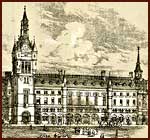
| Introduction |
| The Inheritance |
| Reform to 1850 |
| 1850-1900 |
| Twentieth Century |
| Entire Collection |
| Search the Collection |
| Radical Songs |
| Further Reading |
| Acknowledgements |
| Home |
The Voice of Radicalism
A History of Radicalism - The Inheritance
The constitution in the 18 th century protected landowners' rights. British radicals rejected this. They believed that:
- The middle class, rather than the upper class should be in parliament
- Councillors should be elected. As there were no elections, councillors chose themselves
- Entry to government service should be by competition
- Members of the established churches should not have the power to make public appointments
- The Church of Scotland and the Church of England should be disestablished. The 'established' churches were the official churches of the state. Their members had a great deal of power. Disestablishing them would take away this power
- Tariffs (taxes) should not be applied to imported food. The radicals believed in free trade
- Land rights should be reformed to favour of tenant farmers rather than landowners
Most radicals followed a Utilitarian philosophy. They believed that the country should use its resources efficiently. They also believed in bringing 'the greatest good to the greatest number'. This means that more people, rather than less, should benefit from a policy.
However, most radicals:
- Did not believe that every man and woman should have the vote
- Were against trade unions
- Supported a welfare system that was harsh on the poor and unemployed
The Inheritance >>
